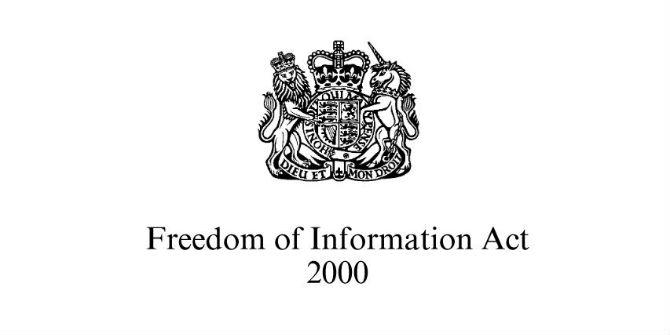Professor Michael Schudson is a Professor at the Columbia Journalism School, and has authored seven books concerning the history and sociology of the American news media, advertising, popular culture, Watergate and cultural memory. Following a recent public lecture at LSE titled ‘Expectations of openness in an age of secrecy’, Catherine Speller of the Media Policy Project interviews Professor Schudson about some of the broad cultural issues around freedom of information.
In your recent talk at the LSE, you outlined some of the underlying social and economic factors that gradually spawned the culture of openness that you argue characterises the period 1960-80 in the United States, including the passing of the Freedom of Information Act in 1966. Thinking about countries beyond the US, what common conditions need to be in place for a cultural move towards openness to occur?
I think writing history is hard and writing sociology far harder. On the surface, one sees or thinks one sees general conditions and general trends. Then you look more closely and generalities get overtaken by contingencies, personalities, accidents, unintended consequences, surprising coincidences. To work back from these contingent factors in the unfolding of history toward some reliable generalities that are more than empty truisms is not so easy.
But I will try to identify a few factors that seem to me very important in the growth of a norm of openness in the US since 1945 well worth testing to see if they are factors also in growing openness elsewhere around the world:
- the growth of higher education, breeding an audience for critical inquiry
- the growing status of evidence-based knowledge. Universities in the 19th century and early 20th century were largely directed to already privileged classes and were more about certifying forms of knowledge that qualified one as a “gentleman” or someone eligible for membership in the professions and other positions of leadership. The “sciences” came fairly late to be central to the curriculum in higher education but they came to have a dominating influence, and much more after 1945 than before.
- there must be room for the survival of powerful elites who do not hold power, that is, for a two-party or a multi-party political system combined with legal and cultural protection for expression and dissent.
- there must be some sense that the public is entitled to participate in the governance of society and should therefore be informed enough about public affairs to do so with some intelligence.
- there must be independent or quasi-independent journalism as well as relative freedom for the formation of other associations and organisations in civil society.
Can there be growing openness without these factors? Yes, perhaps. China may be a case in point from the 1980s until at least the past few years. China has the first two features listed here, but not the third or fourth. It has developed a partially independent journalism but the restrictions on journalism have been and remain severe. The growth of openness can be cut off – and sometimes has been – at a moment’s notice.
Is the road towards a culture of openness a linear one? Or do broad trends towards openness tend to be cyclical in their nature?
We have seen in the final decades of the Soviet Union sometimes a move toward “thaw” and sometimes a move toward “freezing” in internal expression and liberty. We have seen moderately more openness in Democratic than Republican administrations in the United States. We have seen long-term trends in openness from the relatively rigid norms of expression in sexual language and behaviour in Victorian times to more flexibility and openness, regardless of who rules in politics.
It is not easy to imagine in the West a concerted effort, as we see in China in the past several years, to roll back a cultural openness that has grown so strongly since the 1960s. Even after 9/11 when there was a chill in the US on public criticism of the US Government, it was largely a chill of self-censorship and it lasted less than a month before mainstream media returned to their usual level of criticism of government policies, both local (in New York City) and national. (See my analysis of post-9/11 coverage by the New York Times in my Why Democracies Need an Unlovable Press, Polity, 2008).
Recently in the UK, there has been a lot of discussion about the future of the Freedom of Information Act (2000). Following a review by the Independent Commission on Freedom of Information, in March 2016 a Government minister announced that no legal changes (which some had feared would include the introduction of charges) would be made to the Act. Has the Freedom of Information Act in the US come under attack in this way? Are there other fears on the parts of Governments and elite institutions? And what have been common counter-arguments to elites’ fears or other perspectives?
FOIA’s best friend has been inertia. It is established. It has endured nearly 50 years (50 years this summer). It has been used by hundreds of thousands of individuals and groups and it has had hundreds, thousands of successes where the partial or full release of requested documents has led to significant news stories, embarrassments to government, and even prosecutions.
But it has enduring enemies – which is to say, pretty much every federal administrative agency. FOIA requests are a pain in the neck. No agency likes them. But there is an influential pro-FOIA lobby, primarily in the news media and in other civil society organisations (commercial as well as public interest non-governmental organisations that use FOIA regularly. There are recurrently efforts to reform FOIA – sometimes to weaken it, sometimes to strengthen it. Friends of FOIA in the Congress often prevail, bringing together pro-openness liberals and anti-Big-Government, libertarian conservatives. But it is common to find that presidents – this includes Barack Obama – who campaign for office with only the kindest things to say about FOIA and the virtues of transparency, become much more sceptical of FOIA’s virtues after they come to power.
What do you think the legacy of the 1960-80 period has been on what our expectations as a society are of the information we believe we are entitled to? To what extent has the rise of the internet and the wealth of information it houses, played a part in shifting our expectations in the way that we choose to read and interrogate data?
I think there is a decisive legacy. We have a new vocabulary of democracy that is now well rooted. Terms like “informed consent” and “right to know” and “whistle blower” have become commonplace – none of them were in common use before the 1970s (although “informed consent” had some legal use and “right to know” was beginning in the late 1940s to become a rallying cry among activists in journalism).
The sense that government should be “accountable” to the public has grown enormously – including the insistence that that “accountability” should not be only to the citizens at elections but should be renewed regularly through inspectors-general (the Inspectors General Act of 1978) who report on executive government behaviour to the Congress and the public and through legislation like the National Environmental Policy Act (1970) that instituted the “environmental impact statement.” This is a mechanism for the public to learn about – and if so motivated to use litigation to prevent – government actions in the planning stage that might lead to environmental degradation.
“Investigative journalism” became institutionalised from the Vietnam War years on. The Boston Globe’s Spotlight Team recently received great acclaim in the film, Spotlight (that won the Oscar last Sunday night for best picture) for its 2002 investigation of Boston’s Roman Catholic church and its cover-up of the crimes of dozens of priests who sexually abused children. The Spotlight team was established in 1970, preceded in 1967 by Long Island’s Newsday and by the Associated Press, in 1968 by the Chicago Tribune. Certainly there was investigative journalism before 1967, but it was more rare, less institutionalised, and less prominent as a cultural ideal in the field of journalism.
Many of the advances toward transparency arose in the US Congress with little or no media attention, but an increasingly critical news media has helped enormously to support transparency as a central cultural value. They arose before the internet but the internet has unquestionably intensified public expectations that people should have access to the information that affects our lives.
This article gives the views of the author, and does not represent the position of the LSE Media Policy Project blog, nor of the London School of Economics.





1 Comments